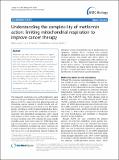Understanding the complex-I-ty of metformin action: limiting mitochondrial respiration to improve cancer therapy
Author(s)
Luengo, Alba; Sullivan, Lucas Bryan; Vander Heiden, Matthew G.
Downloads12915-014-0082-4.pdf (819.4Kb)
PUBLISHER_CC
Publisher with Creative Commons License
Creative Commons Attribution
Terms of use
Metadata
Show full item recordAbstract
Metformin has been a first-line treatment for type II diabetes mellitus for decades and is the most widely prescribed antidiabetic drug. Retrospective studies have found that metformin treatment is associated with both reduced cancer diagnoses and cancer-related deaths. Despite the prevalence of metformin use in the clinic, its molecular mechanism of action remains controversial. In a recent issue of Cancer & Metabolism, Andrzejewski et al. present evidence that metformin acts directly on mitochondria to inhibit complex I and limits the ability of cancer cells to cope with energetic stress. Here, we discuss evidence that supports the role of metformin as a cancer therapeutic.
Date issued
2014-10Department
Massachusetts Institute of Technology. Department of Biology; Koch Institute for Integrative Cancer Research at MITJournal
BMC Biology
Publisher
BioMed Central Ltd
Citation
Luengo, Alba, Lucas B Sullivan, and Matthew G Vander Heiden. “Understanding the Complex-I-Ty of Metformin Action: Limiting Mitochondrial Respiration to Improve Cancer Therapy.” BMC Biology 12, no. 1 (October 24, 2014).
Version: Final published version
ISSN
1741-7007